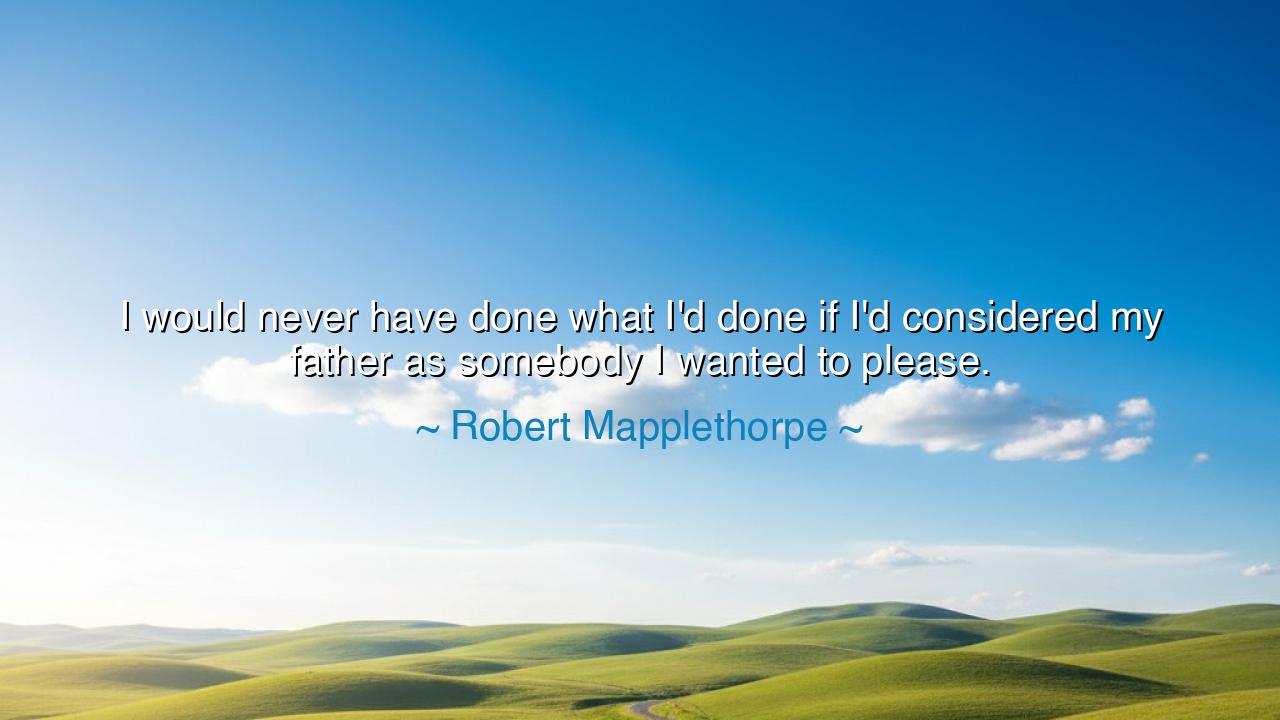
I would never have done what I'd done if I'd considered my father
I would never have done what I'd done if I'd considered my father as somebody I wanted to please.






“I would never have done what I'd done if I'd considered my father as somebody I wanted to please.” — These words of Robert Mapplethorpe rise from the heart of a man who dared to defy the silent chains of expectation. They speak of the eternal struggle between obedience and authenticity, between the comfort of acceptance and the calling of one’s true self. For in every generation, there comes a time when a soul must stand alone — unguarded, unapproved, unafraid — and say, “I will be what I am meant to be, not what others would have me be.”
From the dawn of civilization, the weight of the father’s approval has loomed over sons and daughters like a mighty shadow. It is a force both noble and dangerous — noble, for it calls the young to discipline and virtue; dangerous, for it may bind their wings before they ever learn to fly. Many have lived not their own lives, but the lives their fathers dreamed for them. They built houses of success that felt like prisons of the soul, smiled with pride but wept in silence, and went to their graves never having spoken in their own voice. But Mapplethorpe — artist, provocateur, seeker of beauty — broke that chain. His defiance was not rebellion for its own sake, but an act of creation. He knew that pleasing others often means betraying oneself.
To understand this, one must look not with judgment, but with reverence for the courage it takes to be free. In the eyes of the world, a father’s love seems like a shield — yet for some, it can become a wall. Mapplethorpe’s art, bold and unflinching, could never have been born if he had sought permission to be himself. His work challenged convention, exposed the sacredness of desire, and forced the world to look where it was afraid to see. He walked the path of the artist as warrior, whose loyalty is not to comfort but to truth. In this way, his quote becomes a call not of rebellion, but of liberation — the call to create without fear.
The ancients too spoke of this freedom. The philosopher Socrates, when condemned by the laws of Athens, did not beg for approval from the city that raised him. He drank the hemlock rather than betray the voice within. “The unexamined life,” he said, “is not worth living.” To please the world is easy; to please the soul is sacred. Socrates, like Mapplethorpe, understood that greatness is born not from conformity, but from courage — the courage to stand against even those we love, when love demands we silence the truth within us.
There is in every person a sacred fire — the fire of authenticity. It burns quietly in youth, flickering beneath the gaze of parents, teachers, and peers. Many smother it, fearing its light will offend. But some — the rare few — guard it with their very lives. To please others is to live in borrowed skin; to honor oneself is to wear the truth naked before the world. The one who learns this becomes not arrogant, but alive. For only in being true can we truly love, create, and give meaning to the name we carry.
Let us, however, not mistake this teaching as an invitation to disrespect or rejection. To transcend one’s father is not to despise him, but to honor his gift of life by making something greater of it. Every generation must break the limits of the last; this is how humanity rises. The father builds the foundation, but the child must build the tower that reaches for the sky. To live only to please is to live half-born; to live in truth is to fulfill the divine purpose of being human.
Thus, the lesson of Mapplethorpe’s words is this: True creation demands freedom, and freedom demands courage. The world will always whisper, “Be safe, be like us,” but the voice within will cry, “Be real.” Follow that inner cry. Seek not to please, but to awaken. Honor your parents by fulfilling your own destiny, not by repeating theirs. Speak with your own tongue, love with your own heart, and build your own light.
For the greatest tribute a child can give to a father is not imitation, but transcendence. And the greatest peace a soul can know is not in being approved, but in being true.






AAdministratorAdministrator
Welcome, honored guests. Please leave a comment, we will respond soon